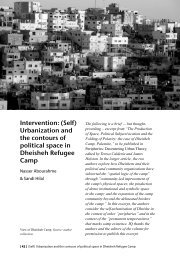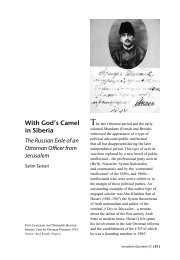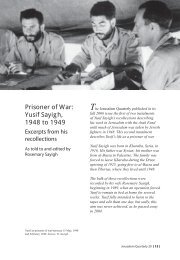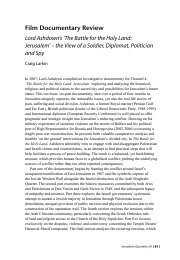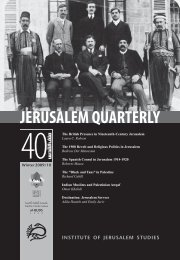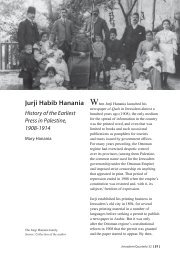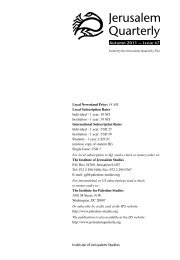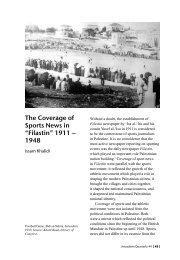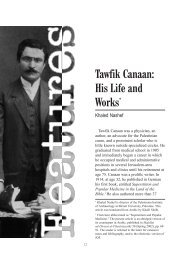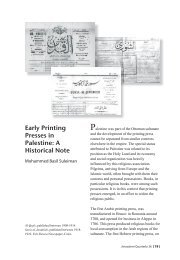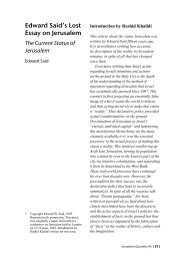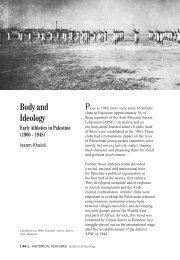PLUNDERING PALESTINE - Jerusalem Quarterly
PLUNDERING PALESTINE - Jerusalem Quarterly
PLUNDERING PALESTINE - Jerusalem Quarterly
You also want an ePaper? Increase the reach of your titles
YUMPU automatically turns print PDFs into web optimized ePapers that Google loves.
The archives of the IAA also contain information about the screening, regulation<br />
of, and movement of archaeological material in Lebanon, Syria, and Transjordan.<br />
Correspondence between June of 1935 and March of 1942 follows the escapades of<br />
Mr. Alexander Rosh (alias ‘Holovtchiner’), a government officer in the Palestinian<br />
Department of Immigration and Statistics who was in the habit of vacationing yearly<br />
in either Egypt or Syria. As Mr. Rosh was an employee of the Mandate government,<br />
his baggage would not be searched as a matter of courtesy. In a letter from a licensed<br />
dealer in antiquities named T. H. Kalemkarian on 22 June, 1935 to R. W. Hamilton, the<br />
acting director of the Department of Antiquities, he outlines how Mr. Rosh on various<br />
occasion approached him with antiquities from Egypt. Ensuing correspondence<br />
between the DOA and the Service des Antiquities in Cairo acknowledges that Mr. Rosh<br />
did indeed export antiquities from Egypt, with permission, but as an unlicensed dealer<br />
in Palestine he was in breach of Section 10 of the Antiquities Ordinance of 1929. 46<br />
Nothing further occurs until a series of letters from 1941-1942 indicate that Mr. Rosh<br />
has moved his operation to Syria. A letter from Hamilton to the Deputy Inspector-<br />
General of the Criminal Investigation Department states:<br />
One of my inspectors was informed recently by an antiquities dealer in<br />
Beirut that Mr. A. Rosh of the Department of Immigration is still trading in<br />
antiquities between Syria, Palestine and Egypt, without always obtaining<br />
the licenses that are required by each of those countries. Mr. Rosh is not a<br />
licensed dealer. 47<br />
By March of 1942, the Palestine Criminal Investigation Department had collected<br />
letters between Mr. Rosh and a dealer in Beirut, which confirmed Mr. Rosh’s guilt.<br />
There is also correspondence documenting the DOA’s triumph in successfully putting<br />
an end to Mr. Rosh’s illegal activities. 48<br />
A number of letters (IAA Archives ATQ 20) from between 1928-1947 indicate the<br />
DOA was heavily involved in monitoring the movement of illegal antiquities from<br />
Syria to Palestine. The final piece of correspondence between the Palestine Police and<br />
the Department of Antiquities indicates that some suspects had been identified:<br />
I refer to your letter dated 29 September, 1947, regarding the illicit importation<br />
of antiquities from Syria. 2. Mohamed Abdul Rahman Saleh is a native<br />
of Silat-Ed-Dahr village in the Jenin Sub-District but resides with his son<br />
Imrawah in Suk El Carmel, Jaffa. It is known that Mohamed makes frequent<br />
visits to Syria. 3. I am informed that Mohamed, together with Abdul Majid<br />
Haj Mohamed and Diad Kassem of Silat-Ed-Dahr village, are implicated in<br />
the smuggling of ancient coins from Syria into Palestine when these articles<br />
are in demand for use as adornments by Bedouin and Fellahin women. 49<br />
[ 34 ] FEATURES The Trade in Palestinian Antiquities


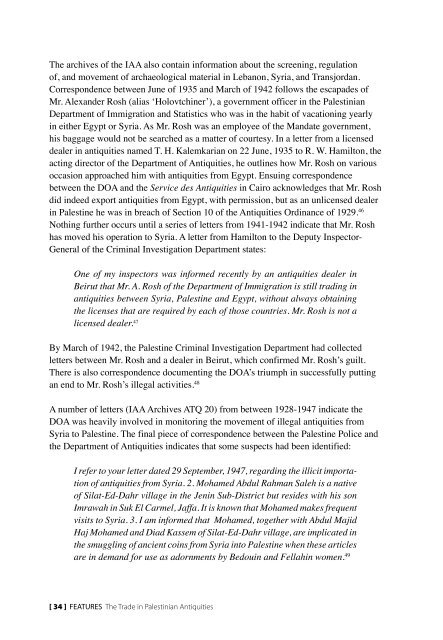
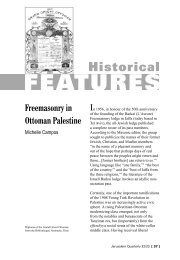
![In Search of Jerusalem Airport [pdf] - Jerusalem Quarterly](https://img.yumpu.com/49007736/1/180x260/in-search-of-jerusalem-airport-pdf-jerusalem-quarterly.jpg?quality=85)
